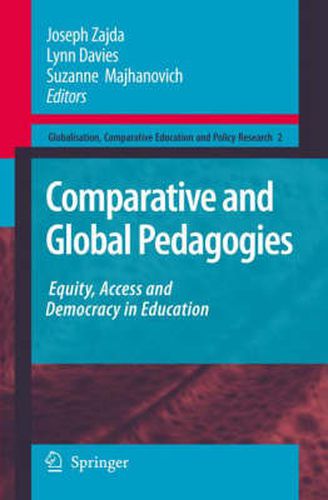Readings Newsletter
Become a Readings Member to make your shopping experience even easier.
Sign in or sign up for free!
You’re not far away from qualifying for FREE standard shipping within Australia
You’ve qualified for FREE standard shipping within Australia
The cart is loading…






This title is printed to order. This book may have been self-published. If so, we cannot guarantee the quality of the content. In the main most books will have gone through the editing process however some may not. We therefore suggest that you be aware of this before ordering this book. If in doubt check either the author or publisher’s details as we are unable to accept any returns unless they are faulty. Please contact us if you have any questions.
A major aim of Comparative and Global Pedagogies: Equity, Access and Democracy in Education which is the second volume in the 12-volume book series Globalisation, Comparative Education and Policy Research, edited by Joseph Zajda and his team, is to present a global overview of recent trends in equity and access in education globally. By examining some of the major education policy issues, particularly in the light of recent shifts in education and policy research dealing with equity and access, the editors aim to provide a comprehensive picture of the intersecting and diverse discourses of globalization, education and policy-driven reforms. The impact of globalization on education policy and reforms is a strategically important issue for us all. More than ever before, there is a need to understand and analyse both the intended and the unintended effects of globalization on edu- tional systems, the state, and relevant policy changes - especially in terms of equity and access, as they affect individuals, educational bodies (such as universities), policy-makers across the globe. Current education policy research dealing with equity and social inequality reflects a rapidly changing world where citizens and consumers are experiencing a growing sense of uncertainty, exclusion and loss of flexibility. Yet globalization exposes us also to opportunities generated by a fast changing world economy.
$9.00 standard shipping within Australia
FREE standard shipping within Australia for orders over $100.00
Express & International shipping calculated at checkout
This title is printed to order. This book may have been self-published. If so, we cannot guarantee the quality of the content. In the main most books will have gone through the editing process however some may not. We therefore suggest that you be aware of this before ordering this book. If in doubt check either the author or publisher’s details as we are unable to accept any returns unless they are faulty. Please contact us if you have any questions.
A major aim of Comparative and Global Pedagogies: Equity, Access and Democracy in Education which is the second volume in the 12-volume book series Globalisation, Comparative Education and Policy Research, edited by Joseph Zajda and his team, is to present a global overview of recent trends in equity and access in education globally. By examining some of the major education policy issues, particularly in the light of recent shifts in education and policy research dealing with equity and access, the editors aim to provide a comprehensive picture of the intersecting and diverse discourses of globalization, education and policy-driven reforms. The impact of globalization on education policy and reforms is a strategically important issue for us all. More than ever before, there is a need to understand and analyse both the intended and the unintended effects of globalization on edu- tional systems, the state, and relevant policy changes - especially in terms of equity and access, as they affect individuals, educational bodies (such as universities), policy-makers across the globe. Current education policy research dealing with equity and social inequality reflects a rapidly changing world where citizens and consumers are experiencing a growing sense of uncertainty, exclusion and loss of flexibility. Yet globalization exposes us also to opportunities generated by a fast changing world economy.